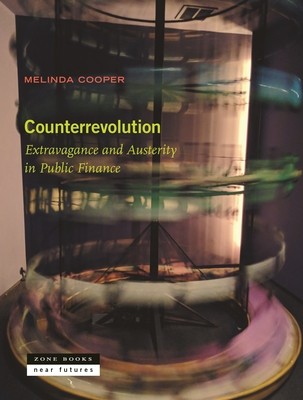
- We will send in 10–14 business days.
- Author: Melinda Cooper
- Publisher: Zone Books
- ISBN-10: 1942130937
- ISBN-13: 9781942130932
- Format: 15.2 x 20.6 x 4.6 cm, kieti viršeliai
- Language: English
- SAVE -10% with code: EXTRA
Reviews
Description
A thorough exploration of the current combination of austerity and extravagance that characterizes government spending and central bank monetary policy
At the close of the 1970s, government treasuries and central banks took a vow of perpetual self-restraint. While, to this day, welfare states do penance for fiscal sins, a closer look at the period of neoliberal ascendancy reveals a deep paradox. For all their pledges to contain debt and stamp out inflation, fiscal and monetary authorities have persistently violated their own moral code to indulge the interests of financial asset holders. Though mere wage earners are condemned to grinding austerity, wealthy investors inhabit a parallel universe of extravagant possibility. Melinda Cooper reads the neoliberal turn in public finance as a counterrevolutionary project--a trauma response to the turmoil of the late 1960s and early 1970s. The book focuses on the role of public choice theory and supply-side economics in driving this counterrevolution and orchestrating the distribution of extravagance and austerity. Neoliberal public finance has not only deepened the divide between rich and poor. It has also reshaped the organizational form of capitalism itself. Dynastic capitalism is back with a vengeance, reckless as in the gilded age but much more actively subsidized by the state. Far-reaching as the neoliberal counterrevolution has been, Cooper still identifies a counterfactual history of unrealized possibilities in the capitalist crisis of the 1970s. She concludes by inviting us to rethink the concept of revolution and raises the question: is another politics of extravagance possible?EXTRA 10 % discount with code: EXTRA
The promotion ends in 24d.05:45:56
The discount code is valid when purchasing from 10 €. Discounts do not stack.
- Author: Melinda Cooper
- Publisher: Zone Books
- ISBN-10: 1942130937
- ISBN-13: 9781942130932
- Format: 15.2 x 20.6 x 4.6 cm, kieti viršeliai
- Language: English English
A thorough exploration of the current combination of austerity and extravagance that characterizes government spending and central bank monetary policy
At the close of the 1970s, government treasuries and central banks took a vow of perpetual self-restraint. While, to this day, welfare states do penance for fiscal sins, a closer look at the period of neoliberal ascendancy reveals a deep paradox. For all their pledges to contain debt and stamp out inflation, fiscal and monetary authorities have persistently violated their own moral code to indulge the interests of financial asset holders. Though mere wage earners are condemned to grinding austerity, wealthy investors inhabit a parallel universe of extravagant possibility. Melinda Cooper reads the neoliberal turn in public finance as a counterrevolutionary project--a trauma response to the turmoil of the late 1960s and early 1970s. The book focuses on the role of public choice theory and supply-side economics in driving this counterrevolution and orchestrating the distribution of extravagance and austerity. Neoliberal public finance has not only deepened the divide between rich and poor. It has also reshaped the organizational form of capitalism itself. Dynastic capitalism is back with a vengeance, reckless as in the gilded age but much more actively subsidized by the state. Far-reaching as the neoliberal counterrevolution has been, Cooper still identifies a counterfactual history of unrealized possibilities in the capitalist crisis of the 1970s. She concludes by inviting us to rethink the concept of revolution and raises the question: is another politics of extravagance possible?

Reviews